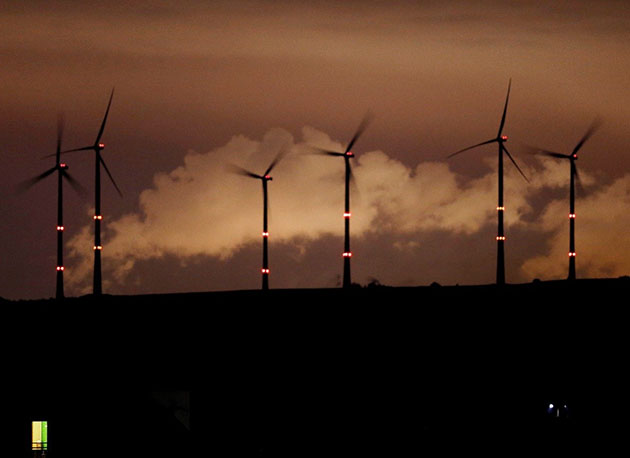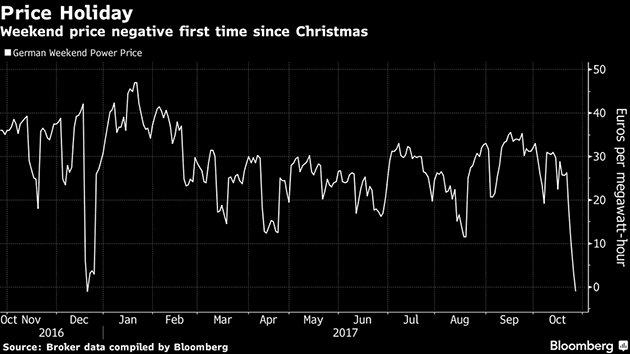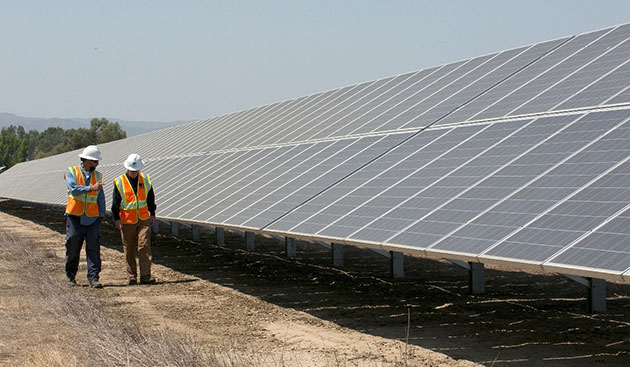| -- | October 31, 2017 This Energy Revolution Could Shrink Your Electric Bill to Zero BY PATRICK WATSON Happy Halloween. Whether you’ll get a trick or a treat is hard to know in this zombified economy. Take negative interest rates. When Europe’s central banks pushed rates below zero, large depositors found themselves paying interest instead of receiving it. But at the same time, some lucky homeowners found their mortgage payments turn into credits. The weirdness continues. Last week, Bloomberg reported that German power producers would likely be paying customers to use electricity this weekend. How does this possibly make sense? The answer is in the wind. 
Photo: AP Blown-Away Prices Normally, utility companies calculate how much a kilowatt-hour of electricity will cost to produce and therefore, how much to charge the customers. That’s pretty easy to do with fossil fuels, but wind production—which Germany depends on heavily—can be volatile due to weather conditions. That means utilities must install extra renewable power capacity to meet demand in suboptimal conditions. The more power is generated, the cheaper it becomes—so in the occasional great conditions, the ratio goes negative, i.e., there’s so much power generated that instead of making a profit, the utility basically has to pay the customers.  Much of the developing world (plus Puerto Rico) has the opposite problem: expensive electricity, and often not enough of it. But that’s changing as renewable energy costs drop. Unlike fossil fuels, we can tap solar and wind energy without reducing their supply. That means their cost curve looks more like a new technology than a dwindling commodity. You’ve heard of Moore’s Law, which says microchip performance doubles every two years. Something similar is happening with renewable energy. Production costs drop as we produce more. Two months ago, the US Department of Energy projected the unsubsidized cost of wind energy could drop 50% from current levels by 2030. That’s not dreamy environmentalist sentiment either. Remember who runs the DOE now: former Texas Governor Rick Perry. He’s one of the oil industry’s best friends—but he saw Texas harvesting wind energy and knows how much it helped our grid. 
Photo: Chris Vreeland via Flickr The Revolution Is Here Just north of Austin, where I live, is Georgetown, population about 65,000. I drive through there when I go to Dallas. It’s a picturesque town with an old courthouse square. Georgetown Mayor Dale Ross is a Trump-supporting, staunch Republican. He decided in 2015 that Georgetown should get all its electricity from renewable sources. Ross, who is also a CPA, says the choice was clear when he ran the numbers. He told The Guardian last month: “The revolution is here,” he said. “And I’m a good little Republican, a rightwing fiscal conservative, but when it comes to making decisions based on facts, that’s what we do.” Prices in the city, Ross said, have declined from 11.4¢ per kilowatt hour in 2008 to 8.5¢ this year. Georgetown sources most of its power from a wind farm 500 miles away in Amarillo and will get solar energy from a farm in west Texas that is expected to be finished next June, meaning the city can attain its 100% renewable goal even when the wind isn’t blowing. This year, Ross said, the tally is about 90%, down from 100% in 2016. “How is anybody going to compete with wind and solar?” said Ross, who has ordered an electric-powered BMW scooter from California and plans to fit solar panels at his home and office. This matches what I’ve thought for a long time. Renewable sources will eventually supply most of the world’s energy, not because governments subsidize them or mandate them, but because they cost less than fossil fuels. That’s not to say the oil, gas, and coal industries will disappear soon. They’ll survive for many years… but they will also shrink. Deny, Delay, or Adapt Remember Kodak? Unable to imagine a world without film, management didn’t adapt to digital photography fast enough. The company went bankrupt in 2012. Fossil fuel producers face a similar dilemma. The world is changing around them. Their choices are to deny, delay, or adapt. The giant oil and gas companies all have renewable energy initiatives and subsidiaries. From what I see, they are mostly half-hearted. I suspect the boards view those segments as a public-relations necessity. Some companies are more serious, though. Top management makes renewable-energy production a high priority. C-level execs take personal interest in it and approve big capital investments. I think the second group has a much brighter future. In fact, it may be even brighter than that of some newer companies that specialize in solar and wind energy. 
Photo: AP A successful business is more than a good idea and a bank account. It’s a culture, a vast set of knowledge and relationships. Building a truly sustainable organization takes time and can’t be duplicated easily. Energy production, whether fossil fuel or renewable, is about solving large-scale, capital-intensive engineering problems—like the major oil companies have been doing for decades. As an investor in renewable energy, I would pick an oil company that’s aggressively moving into wind and solar over a VC-backed Silicon Valley clean-energy startup any day of the week. Europe Goes First I came to this conclusion while looking for dividend-producing stocks for Yield Shark subscribers. I try to find companies with both high current income and a secure long-term future. In evaluating energy stocks, I noticed a pattern in their attitudes to solar and wind projects. European energy companies seem to be much more serious than the major US producers. That means if you only own US energy stocks, or US-focused energy ETFs, your portfolio may be missing an important component. So far, I’ve found two large-cap European energy majors that are doing well on the fossil fuel side and working hard to ramp up renewable energy revenue. Both have dividend yields in the 4–5% range. 
Photo: AP Accelerating Change You might ask why the hurry. Oil and gas companies are making good money—so plenty of time to pivot later. For the answer, look at your iPhone, or Samsung Galaxy, or whatever mobile device you carry. Think about how much these smartphones changed the world. Business, family life, romance, entertainment, education, travel—it’s all radically different now. Not always for the better, but there’s no denying the change. All that change happened in the last 10 years. All of it. Many folks laughed when Apple launched the first iPhone in 2007. “Who needs one of those? My Nokia flip phone is fine.” Few of those people have flip phones anymore. That’s how much the world can evolve in a single decade. And the pace of change has, if anything, accelerated since then. The energy business may not change exactly the way I imagine, but I’m very sure it will change. Your investments need to change with it. See you at the top,  Patrick Watson P.S. If you’re reading this because someone shared it with you, click here to get your own free Connecting the Dots subscription. You can also follow me on Twitter: @PatrickW. | Subscribe to Connecting the Dots—and Get a Glimpse of the Future
We live in an era of rapid change… and only those who see and understand the shifting market, economic, and political trends can make wise investment decisions. Macroeconomic forecaster Patrick Watson spots the trends and spells what they mean every week in the free e-letter, Connecting the Dots. Subscribe now for his seasoned insight into the surprising forces driving global markets. |
 Senior Economic Analyst Patrick Watson is a master in connecting the dots and finding out where budding trends are leading. Patrick is the editor of Mauldin Economics’ high-yield income letter, Yield Shark, and co-editor of the premium alert service, Macro Growth & Income Alert. You can also follow him on Twitter (@PatrickW) to see his commentary on current events. Senior Economic Analyst Patrick Watson is a master in connecting the dots and finding out where budding trends are leading. Patrick is the editor of Mauldin Economics’ high-yield income letter, Yield Shark, and co-editor of the premium alert service, Macro Growth & Income Alert. You can also follow him on Twitter (@PatrickW) to see his commentary on current events.
Share Your Thoughts on This Article

Use of this content, the Mauldin Economics website, and related sites and applications is provided under the Mauldin Economics Terms & Conditions of Use. Unauthorized Disclosure Prohibited The information provided in this publication is private, privileged, and confidential information, licensed for your sole individual use as a subscriber. Mauldin Economics reserves all rights to the content of this publication and related materials. Forwarding, copying, disseminating, or distributing this report in whole or in part, including substantial quotation of any portion the publication or any release of specific investment recommendations, is strictly prohibited.
Participation in such activity is grounds for immediate termination of all subscriptions of registered subscribers deemed to be involved at Mauldin Economics’ sole discretion, may violate the copyright laws of the United States, and may subject the violator to legal prosecution. Mauldin Economics reserves the right to monitor the use of this publication without disclosure by any electronic means it deems necessary and may change those means without notice at any time. If you have received this publication and are not the intended subscriber, please contact service@mauldineconomics.com. Disclaimers The Mauldin Economics website, Yield Shark, Thoughts from the Frontline, Patrick Cox’s Tech Digest, Outside the Box, Over My Shoulder, World Money Analyst, Street Freak, Just One Trade, Transformational Technology Alert, Rational Bear, The 10th Man, Connecting the Dots, This Week in Geopolitics, Stray Reflections, and Conversations are published by Mauldin Economics, LLC. Information contained in such publications is obtained from sources believed to be reliable, but its accuracy cannot be guaranteed. The information contained in such publications is not intended to constitute individual investment advice and is not designed to meet your personal financial situation. The opinions expressed in such publications are those of the publisher and are subject to change without notice. The information in such publications may become outdated and there is no obligation to update any such information. You are advised to discuss with your financial advisers your investment options and whether any investment is suitable for your specific needs prior to making any investments.
John Mauldin, Mauldin Economics, LLC and other entities in which he has an interest, employees, officers, family, and associates may from time to time have positions in the securities or commodities covered in these publications or web site. Corporate policies are in effect that attempt to avoid potential conflicts of interest and resolve conflicts of interest that do arise in a timely fashion.
Mauldin Economics, LLC reserves the right to cancel any subscription at any time, and if it does so it will promptly refund to the subscriber the amount of the subscription payment previously received relating to the remaining subscription period. Cancellation of a subscription may result from any unauthorized use or reproduction or rebroadcast of any Mauldin Economics publication or website, any infringement or misappropriation of Mauldin Economics, LLC’s proprietary rights, or any other reason determined in the sole discretion of Mauldin Economics, LLC. Affiliate Notice Mauldin Economics has affiliate agreements in place that may include fee sharing. If you have a website or newsletter and would like to be considered for inclusion in the Mauldin Economics affiliate program, please go to http://affiliates.ggcpublishing.com/. Likewise, from time to time Mauldin Economics may engage in affiliate programs offered by other companies, though corporate policy firmly dictates that such agreements will have no influence on any product or service recommendations, nor alter the pricing that would otherwise be available in absence of such an agreement. As always, it is important that you do your own due diligence before transacting any business with any firm, for any product or service. © Copyright 2017 Mauldin Economics | -- |
